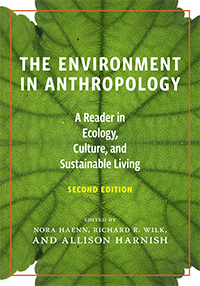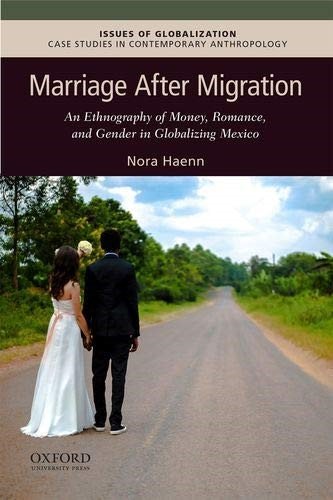
Research & Publications
My research falls within the areas of environmental anthropology, political ecology, agrarian studies, labor migration, and globalization. I am particularly interested in encounters between rural people and various global formations.
Early in my career, I was part of a generation of scholars grappling with protected-area conservation as a new research subject. Drawing from Mexican historiography, I emphasized “everyday forms of state formation” and the culturally laden ways states and citizens engage one another. My book Fields of Power, Forests of Discontent (Univ. of Arizona Press, 2005) described how the creation of the Calakmul Biosphere Reserve, Mexico's largest protected area for tropical ecosystems and a UNESCO world heritage site, affected the everyday lives of the farmers, ranchers, and foresters expected to conform to new environmental regulations. I continue to use this perspective to reassess neoliberalism as an environmental policy and academic critique.
My recent work expands beyond state-citizen relations to examine agrarianism and identities within transnational conservation, development, and labor settings. At the turn of the 21st century, Calakmul was swept into international migration streams, leading me to explore how large-scale migration gets its start and why. Once begun, why can migration be difficult to reverse? I explore the answers to these questions in my book from Oxford University Press, Marriage after Migration: An Ethnography of Money, Romance, and Gender in Globalizing Mexico.
I am in the process of developing a new project that will consider rural livelihoods strategies under climate change. The project, a collaborative and interdisciplinary effort , compares rural livelihoods in the dry tropics on three continents.
SelectedPublications
2019: Lies Build Trust: Social Capital, Masculinity, and Community-Based Resource Management in a Mexican Fishery, w/ Siegelman and Basurto, World Development 2018: Empowering Women? Conditional Cash Transfers in Mexico, in Money from the Government in Latin America (Balen and Fotta, eds) w/ Schmook, Radel, Navarro-Olmedo 2017: The Gender Dynamics of Conditional Cash Transfers, w/ Radel, Schmook, & Green, Women's Studies In'tl Forum 2016: The Middle-Class Conservationist, Current Anthropology
2015: The Legacy of Mexico's Agrarian Reforms, w/ Navarro-Olmedo, Schmook, & Radel, Journal of Agrarian Change
2014: Improving Conservation Outcomes, w/ Schmook, Reyes, & Calme, Conservation Biology
2014: Between Capitalism, the State, and the Grassroots, Olson, Martinez-Reyes, Durand, Conservation and Society
2014: A Cultural Consensus Regarding the King Vulture? w/ Schmook, Reyes, and Calme, Ethnobiology and Conservation
2013: Gentleman-Type Rules and Back Room Deals, w/ R. MCoy, Journal of Political Ecology
2011: Who's Got the Money Now? in Environmental Anthropology Today (Kopnina and Shoreman, eds)
2009: Regulation, Conservation, and Collaboration, w/ E. Shoreman, Human Ecology
2006: Changing and Enduring Ejido, Land Use Policy
2002: Nature Regimes in Southern Mexico, Ethnology
2002: Risking Environmental Justice, in for Social Rights in Latin America (Eckstein & Wickham-Crowley, eds)
2000: Biodiversity is Diversity in Use, The Nature Conservancy
1999: Community Formation in Frontier Mexico, Human Organization
1999: The Power of Environmental Knowledge, 1999, Human Ecology
Popular Press
2008-present Chatham County Line (various, check out this site's Sandbox for recent columns) 2020 Mexico-Centered podcast, Baker Institute at Rice University 2020 New Books Network podcast 2019 interview with KJZZ in Phoenix, AZ
2018 The News and Observer, The Conversation (English, Español) 2013 New York Times Magazine
2010 The State of Things radio interview
Research Data

“La pobreza extrema y la conservación no son compatibles. una reserva ecológica sin pobladores no tiene sentido. Nosotros somos los guardianes de este lugar y somos una leyenda viviente.”
”Extreme poverty and conservation are incompatible. An ecological reserve without inhabitants makes no sense. We are the guardians of this place, and we are living legends.”
Research Data
Interviews on Conservation and Sustainability
Nowadays, Mexican conservation relies heavily on the idea protected areas exist for the purpose of ecotourism. Yet, in the early 1990s, some conservationists argued for a sustainability achieved by empowering local people to advocate for and protect the resources under their control.
The taped interviews below feature Deocundo Acopa Lezama, one of Mexico's foremost advocates for the idea of a locally-based, locally-empowering conservation. Acopa was the first director of the Calakmul Biosphere Reserve. At his initiative, a sprawling program of conservation-development pulled thousands of small-scale producers into the world of environmental protection. His nickname, el tigre de Calakmul, reflected his influence but also the ambiguity with which populism in Mexico often accompanies enduring power structures.
As I write this, parts of Acopa’s program is undergoing a revival, although this historical foundation goes largely unrecognized. In Calakmul, Lopez Obrador’s landmark rural anti-poverty program, Sembrando Vida, employs similar goals and even the physical infrastructure of an earlier moment of agrarian populism. At the same time, the Maya Train has definitively placed conservation in the service of non-local tourists.
Click here to link to a list of interviews in MP3 format. All interviews are in Spanish.
Surveying Smallholder Farmers in Southern Mexico
In 2001, and again in 2010, this project interviewed roughly 150 Calakmul households. Follow the links below to the interview forms from both time periods along with corresponding proposals to the National Science Foundation (BCS 1193739 for 2001 and BCS 0957354 for 2010). Both survey rounds asked separate questions of male and female household heads. The 2001 forms were made possible with the help of David Carr (UCSB) and Dick Bilsborrow (UNC-CH). The 2010 update was made possible via collaboration with Birgit Schmook at ECOSUR-Chetumal and Claudia Radel (USU). Surveys are in Spanish.
Associated files will soon be available.


